
Our research focuses on the cognitive science of learning and language.
🧑🎓➰A full-circle moment, as PiF was the very first academic conference I attended as a MA student.
Pavia, Italy
12-13 MAY 2026 (please not that the date in the previous post was incorrect)
Abstract submission deadline: 20 February 2026
Early registration deadline: 31 March 2026
Registration deadline: 1 May 2026
sites.google.com/view/pifpavia

🧑🎓➰A full-circle moment, as PiF was the very first academic conference I attended as a MA student.
While individual differences have brought my lab both excitement and headaches in recent years, I liked the optimistic take of @cuiding.bsky.social.

While individual differences have brought my lab both excitement and headaches in recent years, I liked the optimistic take of @cuiding.bsky.social.
Painting of the conference: defo the season for a good cuppa tea now ☕️


Painting of the conference: defo the season for a good cuppa tea now ☕️
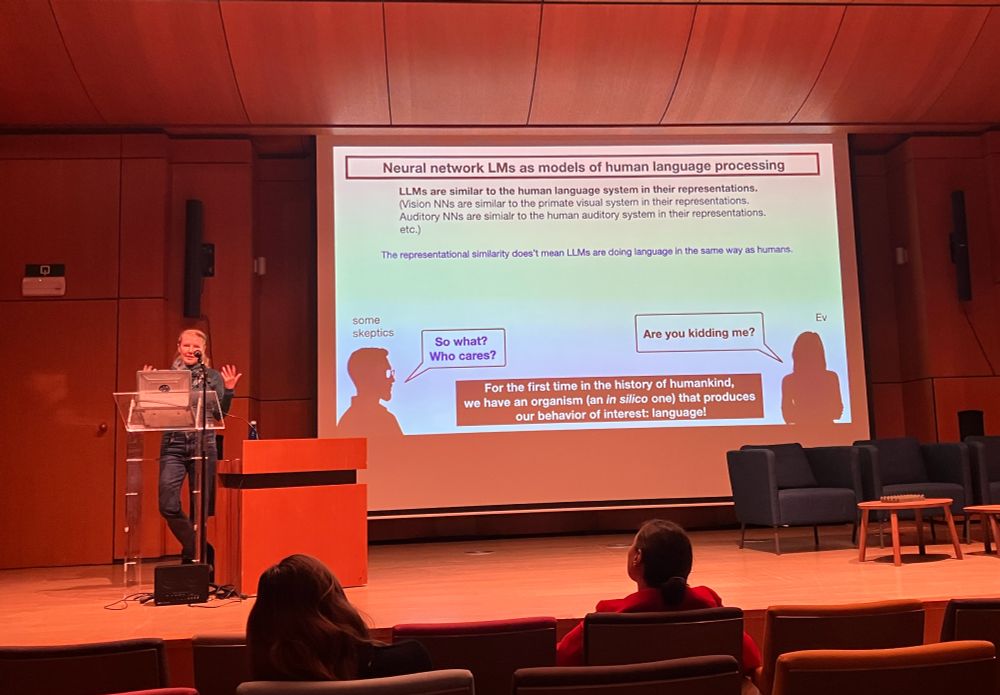

The theme: AI and the Human Brain 🤖 🧠
We’re thrilled to welcome 6 amazing invited speakers:
@evfedorenko.bsky.social, @nicoschuck.bsky.social, @summerfieldlab.bsky.social, @jeffreybowers.bsky.social, @irisgroen.bsky.social & @mtoneva.bsky.social
Our #Consensus paper presents the collective insights of 27 researchers worldwide 🌎 💬 🌍 💬 🌏 💬:
🔗 doi.org/10.31234/osf...


Our #Consensus paper presents the collective insights of 27 researchers worldwide 🌎 💬 🌍 💬 🌏 💬:
🔗 doi.org/10.31234/osf...
Dutch language models reveal how word predictability shapes reading.
🧪 Key findings:
➡️ Smaller models often outperform larger ones
➡️ Predictability follows a logarithmic effect
➡️ Dutch > multilingual models
👉 www.vscentrum.be/post/a-syste...

Dutch language models reveal how word predictability shapes reading.
🧪 Key findings:
➡️ Smaller models often outperform larger ones
➡️ Predictability follows a logarithmic effect
➡️ Dutch > multilingual models
👉 www.vscentrum.be/post/a-syste...
@boevesam.bsky.social
made this interactive visualisation to get a feeling for word predictability:
🔗 wordpredictabilityvisualized.vercel.app
Curious how these predictability indices were obtained? Find out in our new paper!
🔗 doi.org/10.3758/s134...
#Reading #LargeLanguageModels #MECO
@boevesam.bsky.social
made this interactive visualisation to get a feeling for word predictability:
🔗 wordpredictabilityvisualized.vercel.app
Curious how these predictability indices were obtained? Find out in our new paper!
🔗 doi.org/10.3758/s134...
#Reading #LargeLanguageModels #MECO
🔗 ugent.qualtrics.com/jfe/form/SV_...
🔗 ugent.qualtrics.com/jfe/form/SV_...
The deadline for nominations is August 15, 2025. Instructions in the thread.

The deadline for nominations is August 15, 2025. Instructions in the thread.
Check out our new preprint: doi.org/10.31234/osf...

Check out our new preprint: doi.org/10.31234/osf...
Our keynotes:
@jennysaffran.bsky.social with 30 years of SL work since 1996.
@noranewcombe.bsky.social on learning and spatial cognition.
@pyoudeyer.bsky.social on curiosity.
Our keynotes:
@jennysaffran.bsky.social with 30 years of SL work since 1996.
@noranewcombe.bsky.social on learning and spatial cognition.
@pyoudeyer.bsky.social on curiosity.
We show that blinks are more likely:
(1) around punctuation marks
(2) following fixations on lower-frequency and less predictable words.
🔗 Now out in Scientific Reports: www.nature.com/articles/s41...
#CognitiveScience #Reading #EyeTracking
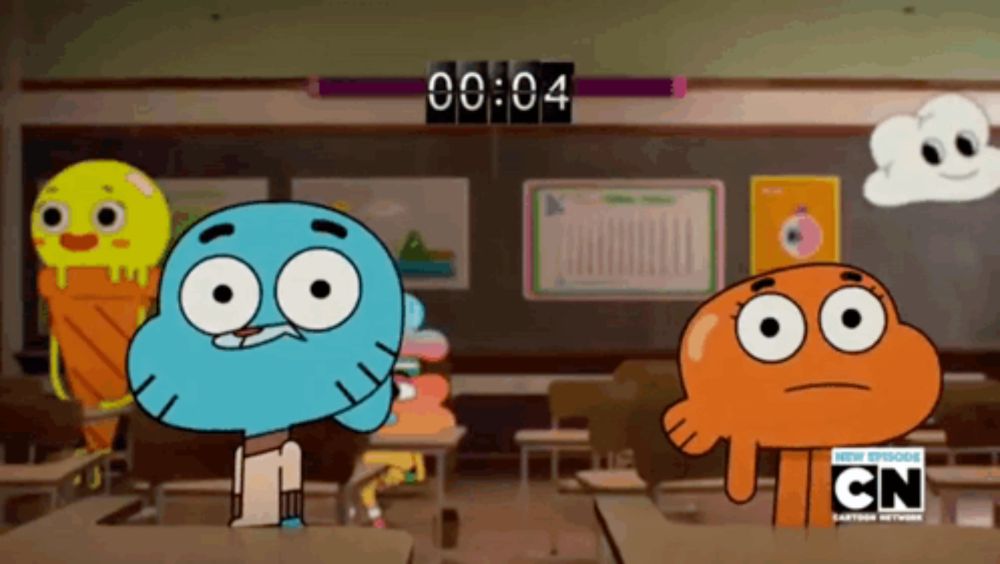
We show that blinks are more likely:
(1) around punctuation marks
(2) following fixations on lower-frequency and less predictable words.
🔗 Now out in Scientific Reports: www.nature.com/articles/s41...
#CognitiveScience #Reading #EyeTracking
The theme: AI and the Human Brain 🤖 🧠
We’re thrilled to welcome 6 amazing invited speakers:
@evfedorenko.bsky.social, @nicoschuck.bsky.social, @summerfieldlab.bsky.social, @jeffreybowers.bsky.social, @irisgroen.bsky.social & @mtoneva.bsky.social
The theme: AI and the Human Brain 🤖 🧠
We’re thrilled to welcome 6 amazing invited speakers:
@evfedorenko.bsky.social, @nicoschuck.bsky.social, @summerfieldlab.bsky.social, @jeffreybowers.bsky.social, @irisgroen.bsky.social & @mtoneva.bsky.social
Haoyu Zhou in the symposium #StatisticalLearning and its Role in #Language and #Reading acquisition.
@boevesam.bsky.social in the symposium From Babies to Semantics: Leveraging #LanguageModels for #Psycholinguistic Research.
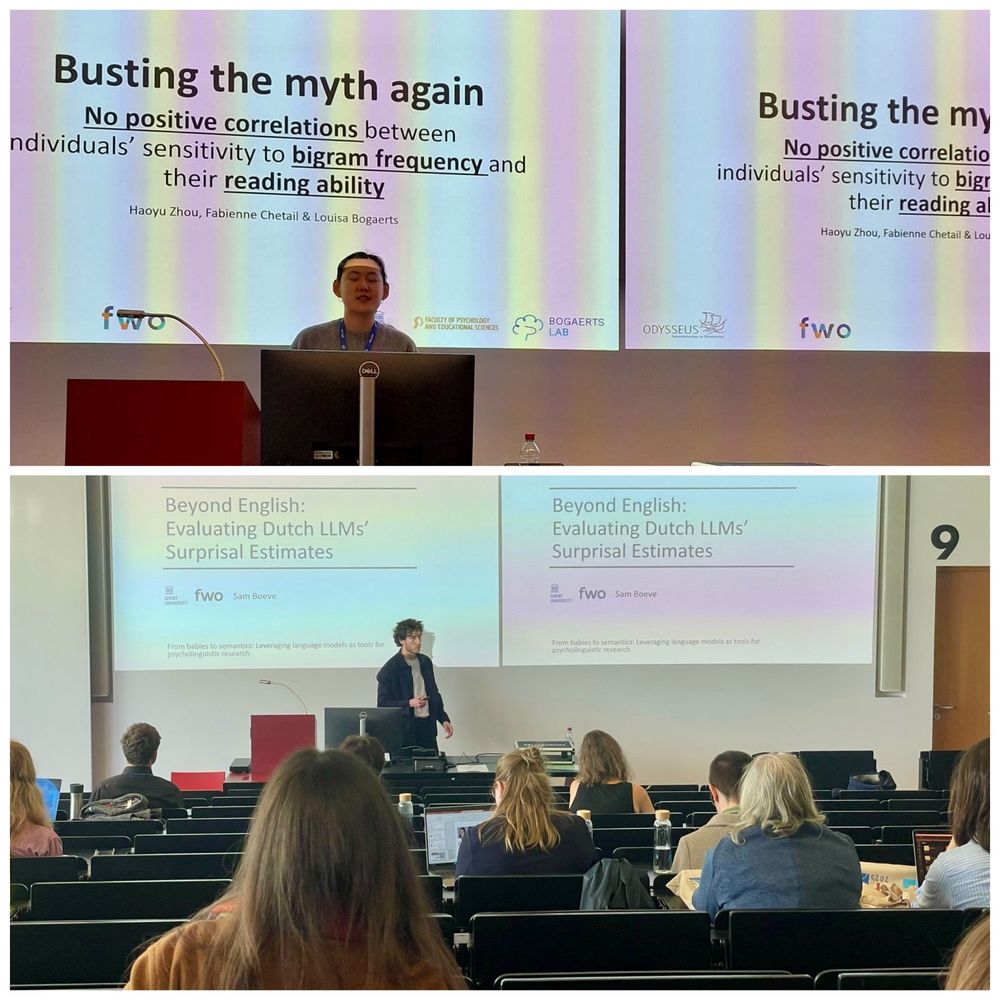
Haoyu Zhou in the symposium #StatisticalLearning and its Role in #Language and #Reading acquisition.
@boevesam.bsky.social in the symposium From Babies to Semantics: Leveraging #LanguageModels for #Psycholinguistic Research.
We argue that our environment (including our linguistic environment) is far from fixed: It's dynamic, and we interact with it.
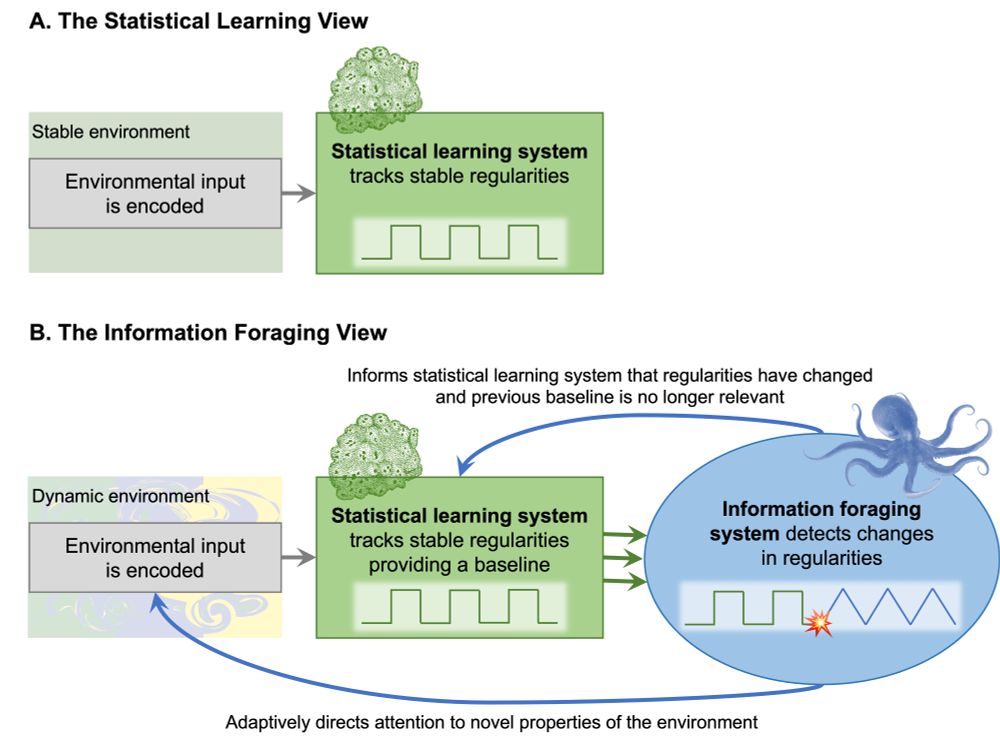
We argue that our environment (including our linguistic environment) is far from fixed: It's dynamic, and we interact with it.
The advantage of spaced studying is well documented for explicit learning, but is there such an advantage for incidental #StatisticalLearning of novel #Language?
Jasper de Waard from @jthee.bsky.social’s lab tested it! Find out what we found here : 🔗 doi.org/10.3758/s134...
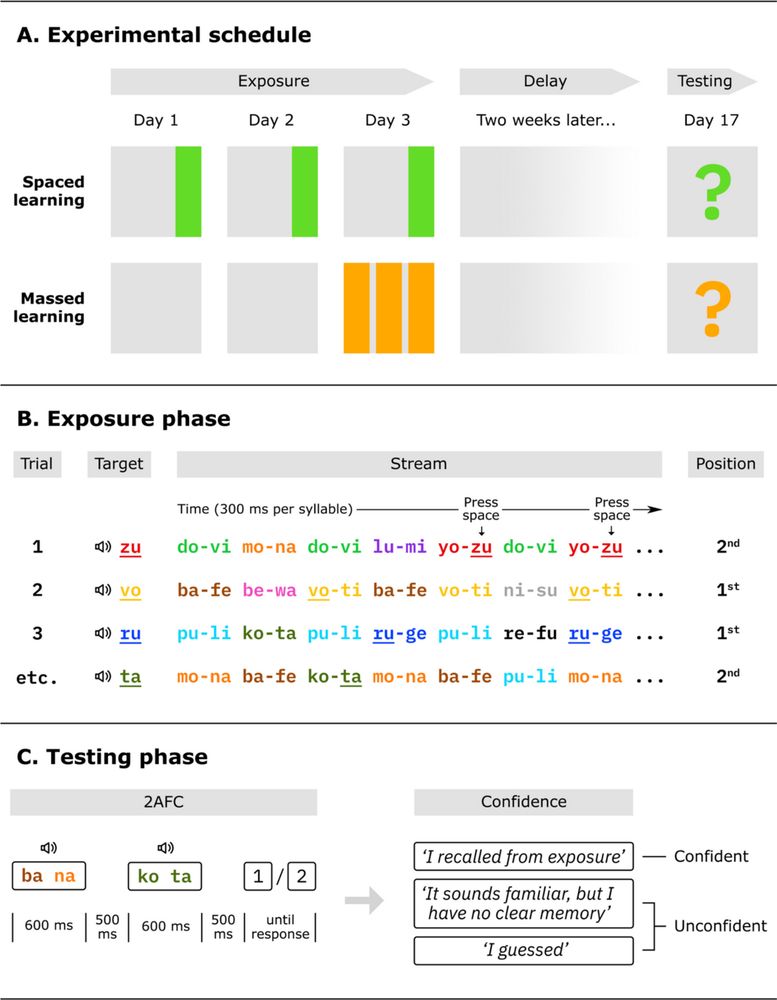
The advantage of spaced studying is well documented for explicit learning, but is there such an advantage for incidental #StatisticalLearning of novel #Language?
Jasper de Waard from @jthee.bsky.social’s lab tested it! Find out what we found here : 🔗 doi.org/10.3758/s134...
"Blinking may give your brain a micro break during cognitive tasks"
🔗 www.newscientist.com/article/2461...
"Blinking may give your brain a micro break during cognitive tasks"
🔗 www.newscientist.com/article/2461...
🔗 osf.io/preprints/os... #ReadingResearch

🔗 osf.io/preprints/os... #ReadingResearch
Sharing the often untold aspects of becoming and being a scientist (doubts, difficulties, rejections and imposter experiences) felt very meaningful.
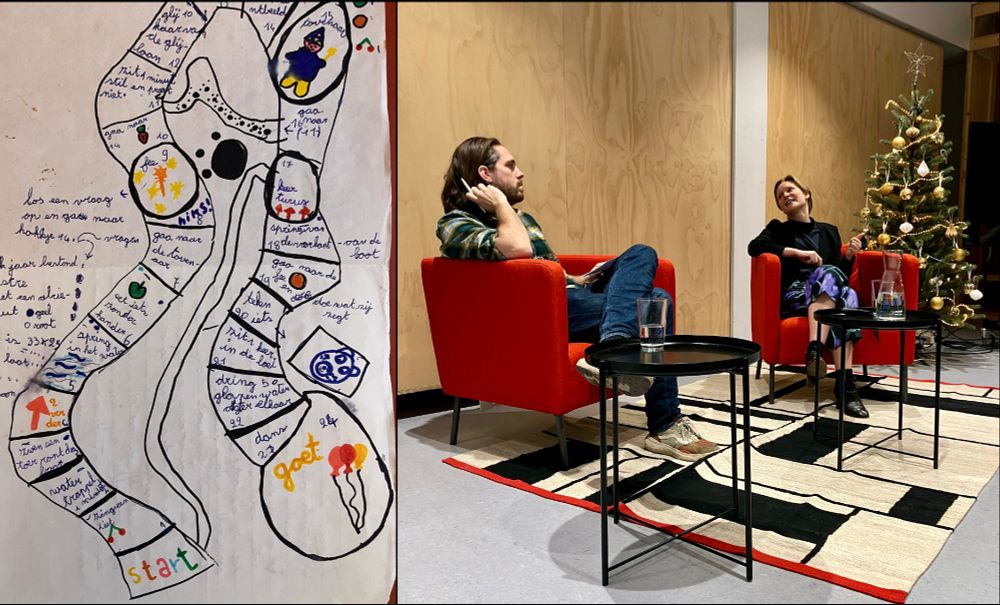
Sharing the often untold aspects of becoming and being a scientist (doubts, difficulties, rejections and imposter experiences) felt very meaningful.
A few weeks ago, I received this plant support in the brain shape of my lab logo from a PhD student.
Hard to convey how much I love nerdy gifts!


A few weeks ago, I received this plant support in the brain shape of my lab logo from a PhD student.
Hard to convey how much I love nerdy gifts!
Xander analyzed over 30.000 blink events in the Ghent Eye Tracking Corpus to find out.
Could we replicate Hall (1945) who drew his conclusions based on just 139 blinks he counted by observing readers?
Find out in our preprint:
🔗 doi.org/10.31234/osf...
Xander analyzed over 30.000 blink events in the Ghent Eye Tracking Corpus to find out.
Could we replicate Hall (1945) who drew his conclusions based on just 139 blinks he counted by observing readers?
Find out in our preprint:
🔗 doi.org/10.31234/osf...
The title says it all: 'A meta analysis of 97 studies reveals that statistical learning and language ability are only weakly correlated'. For those who like exact numbers, r = 0.16.
📑 osf.io/preprints/ps...

The title says it all: 'A meta analysis of 97 studies reveals that statistical learning and language ability are only weakly correlated'. For those who like exact numbers, r = 0.16.
📑 osf.io/preprints/ps...

